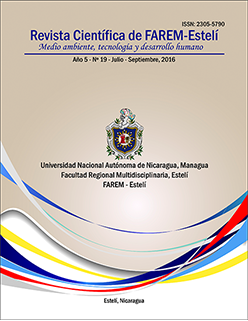Review of studies about HIV/AIDS and the model of Nicaraguan sexuality
DOI:
https://doi.org/10.5377/farem.v0i19.2974Keywords:
HIV/AIDS, education, prevention, epidemics, culture, sexuality.Abstract
This article derives from the review of studies on HIV/AIDS, developed in Nicaragua from the year 2000 to the date, and is part of a project called “Conocimientos y Prácticas de Riesgo en VIH/sida. Una estrategia de Cooperación en Educación para el Desarrollo en Nicaragua” (Knowledge and Practices of Risk of HIV/AIDS. A Strategy of Cooperation in Education for the Development in Nicaragua), developed by Universidad Pablo de Olavide (UPO) and Facultad Regional Multidisciplinar de Chontales (FAREM-Chontales), of Universidad Nacional Autónoma de Nicaragua, Managua. In order to create a theoretical framework of scientific studies developed in Nicaragua on HIV/AIDS and the sexual culture of Nicaraguans, a bibliographical revision of the last fifteen years was made. Nine studies were revised in total. We conclude that the epidemics continue to increase in Nicaragua, even though it occurs in a controlled way, among the young population between 15 and 39 years, mainly in men with heterosexual orientation. Some studies reveal the possibility of men that have intercourse with other men within that population. The population of transsexuals and sexual workers are not visible, due to discrimination. Taking these data into account, the need of educating the population and especially the young sector is highly important, as they are the in a high risk. Only education can achieve an efficient prevention and a real social change.
Downloads
953
Downloads
Published
How to Cite
Issue
Section
License
© Revista Científica de FAREM-Estelí

